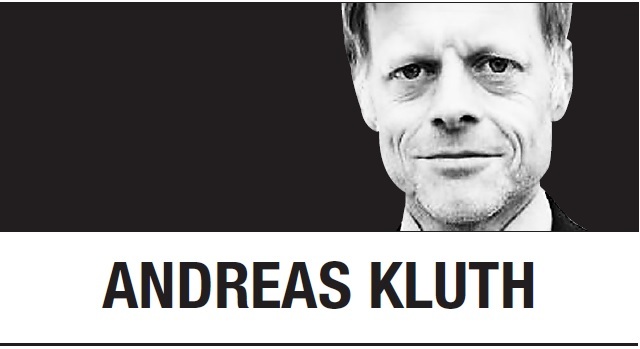
It’s always interesting to see who’s celebrating. In German politics, that’s currently the Left Party, a descendant of East Germany’s former dictatorship that likes to brew anti-Americanism and Russophilia into a toxic populist mix.
The party’s bosses are delighted about a rumor, first reported by the Wall Street Journal, that the US may pull out some 9,500 of the 34,500 American troops stationed in Germany, and then cap their numbers at 25,000. Dietmar Bartsch, the Left’s caucus leader, suggested that Germany should urge the US to withdraw all its forces and get it to take home American nukes as well. In Moscow, President Vladimir Putin must be wondering at his luck.
As with other bluster emanating from the White House under President Donald Trump, this threatened drawdown may never happen. One reason is that it would simply be too stupid from a strategic and logistical perspective.
That’s because the Americans are there not only to deter Russian aggression, which they could also do from Poland -- whose prime minister immediately put up his hand to accommodate any surplus US troops. The “Amis,” as Germans call the the American forces, also use Germany as their hub for missions in the Middle East and Africa. GIs flying to or from Iraq and Afghanistan, for example, pass through Ramstein, the biggest US air base on foreign soil. If wounded, they get treated at nearby Landstuhl.
Some veterans of the ever-turbulent US-German relationship are therefore rolling their eyes. It’s possible that Trump is just having another tantrum about German Chancellor Angela Merkel, who recently said she wouldn’t attend a G-7 summit Trump was planning to host, and whom Trump seems to scorn as his symbolic nemesis. The rumor could also be a Parthian shot by Richard Grenell, the outgoing US ambassador to Germany, who feels snubbed by the Berlin establishment.
Others, looking beyond the Trump years, see a possible drawdown as another episode in the increasing estrangement between the US and Germany. John Kornblum, a US ambassador in the Clinton era, notes that Washington has for decades been reducing troop numbers in Germany but usually with much less media attention. Trump, Kornblum adds, “joins the last three presidents” in criticizing Germany’s part in NATO’s joint defense planning.
Germany has indeed been a disappointing ally. It’s long spent far less on its own military than NATO members have pledged. If it ever came to a hot war, its army would be a joke. Germany also has a tin ear to its friends’ other worries. For example, it insists on forging ahead with Nord Stream 2, a second gas pipeline through the Baltic connecting Russia and Germany. Allies from Warsaw to Washington think this would make Western Europe more reliant on Russian energy and Eastern Europe more vulnerable.
But none of this should distract from the disaster that Trump has been for the transatlantic alliance, and the even bigger catastrophe that a break between the US and Germany would be. Since World War II, German reconstruction, rehabilitation and reunification, as well as European integration, have only been possible thanks to the protection offered by America. That’s why I’ve argued that, not only strategically but also psychologically, losing the US to Trump has for Germans felt “like losing a father.”
The damage of a deeper rift would imperil America’s relationships and alliances everywhere. Whether he intends to actually bring US troops home or not, Trump is yet again showing contempt for America’s friends -- by not talking to them, by bullying them and by treating them no better, and often worse, than the autocrats he coddles.
From Berlin to Paris, London, Tokyo, Seoul, Ottawa and Canberra, leaders are concluding that America’s support is no longer categorical but transactional, and that it’s time to make other arrangements. The tragedy for Europe is that there may never be a credible alternative to American military protection.
The tragedy for the world is that, without the US as its guarantor, the wider “West” is ceasing to exist as an idea, leading to global instability and anxiety, or “Westlessness.” This West -- admittedly a slippery notion -- represented a community of nations that saw liberal values as worth defending in a pinch, especially against authoritarianism. Germans are certainly among those doubting whether Trump’s America is, in that sense, Western.
There are many reasons to hope that Joe Biden defeats Trump in November. Creeping geopolitical disintegration is a big one, and the piecemeal rift in US-German and US-European relations is a part of that. Let’s hope the Americans stay in Germany, and that Europeans reciprocate by doing their part in military defense. Otherwise, it’ll be the cynics celebrating, from Germany’s anti-American Left to the autocrats in Moscow, Beijing and elsewhere.
Andreas Kluth
Andreas Kluth is a columnist for Bloomberg Opinion. -- Ed.
(Bloomberg)








